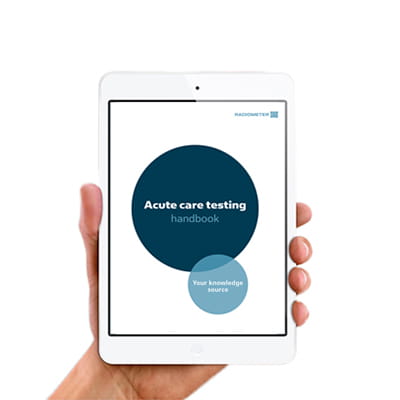Printed from acutecaretesting.org
September 2016
Laboratory diagnosis of sepsis
Summarized from Fan S-L, Miller N, Lee J et al. Diagnosing sepsis – The role of laboratory medicine. Clin Chim Acta 2016; 460: 203-10.
Sepsis and septic shock are related consequences of infection that together are a common cause of serious morbidity and high mortality around the world. Survival after sepsis/septic shock depends on rapid diagnosis and treatment with intense monitoring in a critical care unit.
Following a 2-year expert appraisal of current (but still incomplete) understanding of the pathobiology of sepsis, the Third International Consensus Definitions for Sepsis and Septic Shock (Sepsis-3) were published earlier this year.
Sepsis is now defined as “life-threatening organ dysfunction caused by a dysregulated host response to infection”. And septic shock is now defined as “a subset of sepsis in which particularly profound circulatory, cellular, and metabolic abnormalities are associated with a greater risk of mortality than with sepsis alone”. The additional category “severe sepsis” present in previous definitions was judged unhelpful by the Sepsis-3 task force, and is omitted from this most recent definition.
Sepsis-3 represents a significant development for both sepsis research and the criteria clinical staff use to diagnose sepsis. This recently published review of the role of laboratory medicine in sepsis diagnosis is therefore particularly timely.
It is clear from this review that a biomarker with high sensitivity and specificity for sepsis that can be assayed with speed and accuracy remains elusive. As the authors simply state: “In 2016 there is no single laboratory test that accurately diagnoses sepsis”.
Despite this somewhat gloomy reality, the authors are able to identify a number of laboratory tests that have proven or potential value in the assessment of patients with suspected sepsis/septic shock. They deal with each of these tests under three headings: clinical chemistry tests; hematology tests and microbiology tests.
Under the heading of clinical chemistry, the main focus for discussion is three tests: procalcitonin (PCT), lactate and C-reactive protein (CRP). Of particular note from this discussion, PCT is currently the only FDA-approved test to aid in the diagnosis of sepsis, and raised lactate (>2 mmol/L) is now, as a result of Sepsis-3, a defining feature of septic shock.
Apart from these three tests, the review includes discussion of other clinical chemistry tests that cited research has suggested might be useful in helping to assess risk of sepsis. These include: D-dimer and cardiac markers (troponin, myoglobin). The authors also briefly review ongoing research investigating the value of proposed novel biomarkers of sepsis.
As Sepsis-3 makes clear, organ dysfunction is central to sepsis and septic shock. The Sepsis-3 task force recommend use of a formal assessment of organ dysfunction known as Sequential [Sepsis-related] Organ Failure (SOFA). Determination of a patient’s SOFA score requires a few readily available clinical details and results of laboratory testing. Three routine clinical chemistry laboratory tests are necessary for SOFA scoring: creatinine, bilirubin and pO2(a). One hematology test (platelet count) is also required.
The final section of this review article focuses on microbiological testing. The role of traditional microbiological culture is limited in the context of sepsis diagnosis because of inevitable time delay involved. (Authors of this review cite research that suggests every hour of delay in treatment increases mortality of septic shock by 7.6 %.)
Acknowledging the limitation of microbiological culture, the authors devote most of this section to discussion of novel culture-independent technologies that promise rapid pathogen detection at the point of care.
May contain information that is not supported by performance and intended use claims of Radiometer's products. See also Legal info.
Acute care testing handbook
Get the acute care testing handbook
Your practical guide to critical parameters in acute care testing.
Download nowScientific webinars
Check out the list of webinars
Radiometer and acutecaretesting.org present free educational webinars on topics surrounding acute care testing presented by international experts.
Go to webinars







